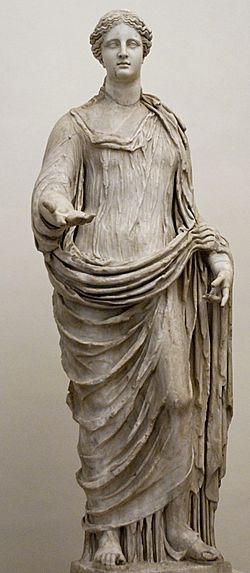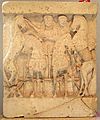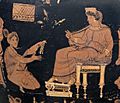Demeter facts for kids
Quick facts for kids Demeter |
|
|---|---|
| Goddess of agriculture, harvest, fertility and sacred law. | |

A marble statue of Demeter, National Roman Museum
|
|
| Other names | Sito, Thesmophoros |
| Abode | Mount Olympus |
| Symbol | Cornucopia, wheat, torch, bread |
| Festivals | Thesmophoria, Eleusinian Mysteries |
| Personal information | |
| Consort | Iasion, Zeus, Carmanor, Poseidon |
| Children | Persephone, Despoina, Arion, Plutus, Philomelus, Eubuleus, Chrysothemis |
| Parents | Cronus and Rhea |
| Siblings | Hestia, Hera, Hades, Poseidon, Zeus, Chiron |
| Roman equivalent | Ceres |
Demeter is the Greek goddess of the harvest and farming. She is one of the Twelve Olympians, the most important gods and goddesses in Greek mythology.
Demeter was the older sister of Zeus, the king of the gods. She was in charge of grains and making the earth fertile. Farmers looked up to her as their special goddess. People believed she taught humans how to grow crops and harvest them.
Demeter is the mother of Persephone, whose father is Zeus. Persephone later became the wife of Hades, the god of the underworld. Both Demeter and Persephone were very important in the Eleusinian Mysteries. These were special festivals held in their honor.
Demeter's symbols include the scythe, a cornucopia (horn of plenty), wheat, and bread. Her sacred animals were the pig and the snake. In Roman mythology, her equivalent is Ceres.
Contents
The Story of Persephone and the Seasons
The most famous myth about Demeter is the story of her daughter, Persephone. Hades, the god of the underworld, kidnapped Persephone to make her his wife. Demeter was heartbroken and searched everywhere for her daughter.
Her sadness caused a great famine on Earth. Nothing would grow, and people began to starve. To save all life, Zeus sent his messenger, Hermes, to the underworld. He told Hades to bring Persephone back.
Hades agreed, but only if Persephone had not eaten anything in his realm. Unfortunately, Persephone had eaten a few pomegranate seeds. Because of this, she had to spend part of each year in the underworld. The rest of the year, she could be with her mother.
This cycle explains why we have seasons. When Persephone is with Hades, Demeter grieves, and the earth becomes cold and barren (autumn and winter). When Persephone returns to her mother, Demeter is happy, and the earth becomes fertile and full of life (spring and summer).
Demeter's Gifts to Humankind
Demeter was known for helping people who were kind to her. She also taught humans important skills.
Teaching Agriculture to Triptolemus
After Persephone was taken, Demeter searched far and wide. She came to the palace of Celeus, the King of Eleusis. Demeter disguised herself as an old woman. King Celeus and his wife, Metanira, kindly offered her shelter.
To thank them, Demeter taught their son, Triptolemus, the secrets of farming. She gave him a special chariot pulled by serpents and seeds. She told him to travel the world and teach everyone how to plant, grow, and harvest grain. This is how humanity learned agriculture.
One time, Triptolemus traveled to the land of King Lyncus. Lyncus pretended to be friendly. But when Triptolemus fell asleep, Lyncus tried to kill him with a dagger. He wanted to take credit for Triptolemus's work. Demeter saved Triptolemus by turning King Lyncus into a lynx. She then told Triptolemus to fly home.
Philomelus and the Plough
Demeter was also impressed by her son Philomelus. He invented the plough, a tool used to prepare fields for planting. Because of his great invention, Demeter honored him forever. She turned him into a constellation in the sky called Boötes.
Demeter's Anger and Justice
Demeter could also be very angry when people disrespected her or her sacred things.
Erysichthon's Punishment
There was a king named Erysichthon in Thessaly. He decided to cut down all the trees in one of Demeter's sacred groves. He wanted to build an extension for his palace. One huge oak tree was covered with wreaths, showing all the prayers Demeter had answered. Erysichthon's men refused to cut it.
So, the king grabbed an axe and cut it down himself. In doing so, he killed a dryad nymph who lived in the tree. The nymph's dying words were a curse on Erysichthon.
Demeter punished the king severely. She called upon Limos, the spirit of endless hunger. Limos entered Erysichthon's stomach. The more the king ate, the hungrier he became. He sold all his belongings to buy food. Eventually, he even sold his own daughter, Mestra, into slavery. In the end, Erysichthon became so hungry that he ate himself.
Festivals for Demeter
Demeter was honored with two major festivals in ancient Greece. These were sacred mysteries, meaning they involved secret rituals.
- The Thesmophoria festival was held in October and was only for women.
- The Eleusinian Mysteries were open to anyone who wanted to join, no matter their gender or social class.
Both festivals focused on the myths of Demeter as a mother and Persephone as her daughter.
Related pages
Images for kids
-
Demeter drives her horse-drawn chariot containing her daughter Persephone-Kore at Selinunte, Sicily, 6th century BC.
-
Demeter on a Didrachme from Paros island, struck at the Cyclades.
-
Demeter, enthroned and extending her hand in a benediction toward the kneeling Metaneira, who offers the triune wheat (c. 340 BC)
-
Demeter in an ancient Greek fresco from Panticapaeum in the Bosporan Kingdom (a client state of the Roman Empire), 1st century Crimea.
-
Triptolemus, Demeter and Persephone by the Triptolemos-painter, c. 470 BC, Louvre
-
Pompeiian relief of Demeter in her aspects of mother goddess and goddess of agriculture
See also
 In Spanish: Deméter para niños
In Spanish: Deméter para niños
 | Lonnie Johnson |
 | Granville Woods |
 | Lewis Howard Latimer |
 | James West |











